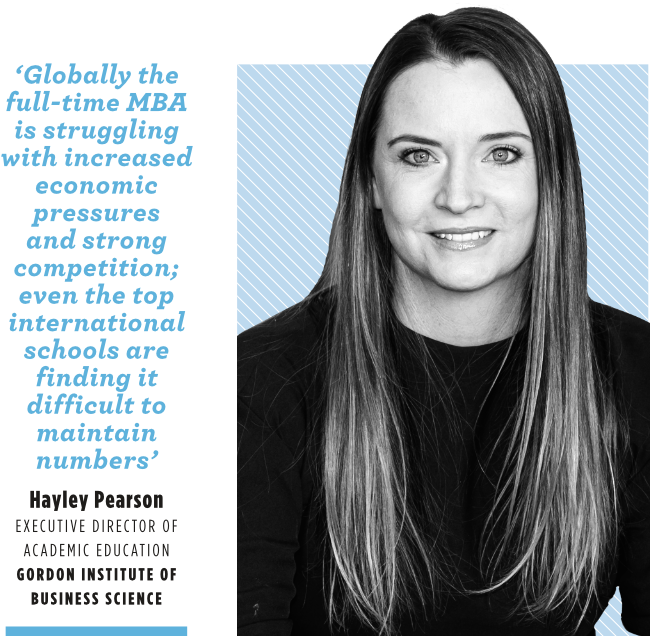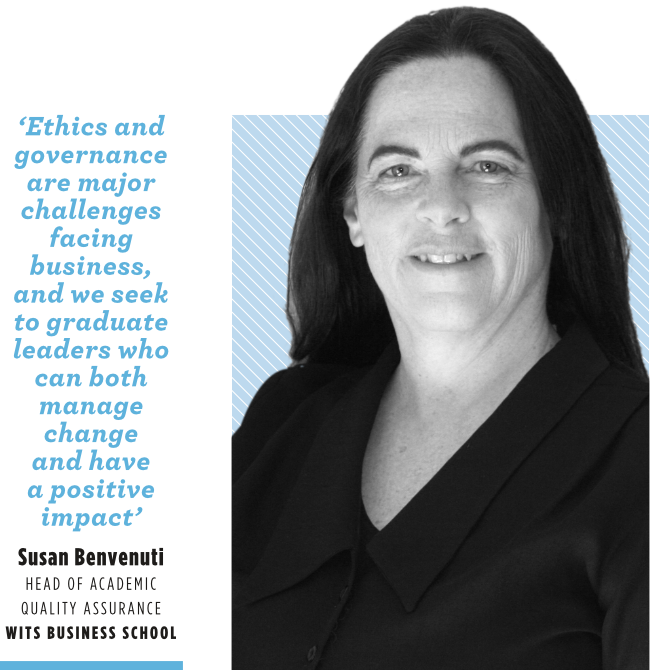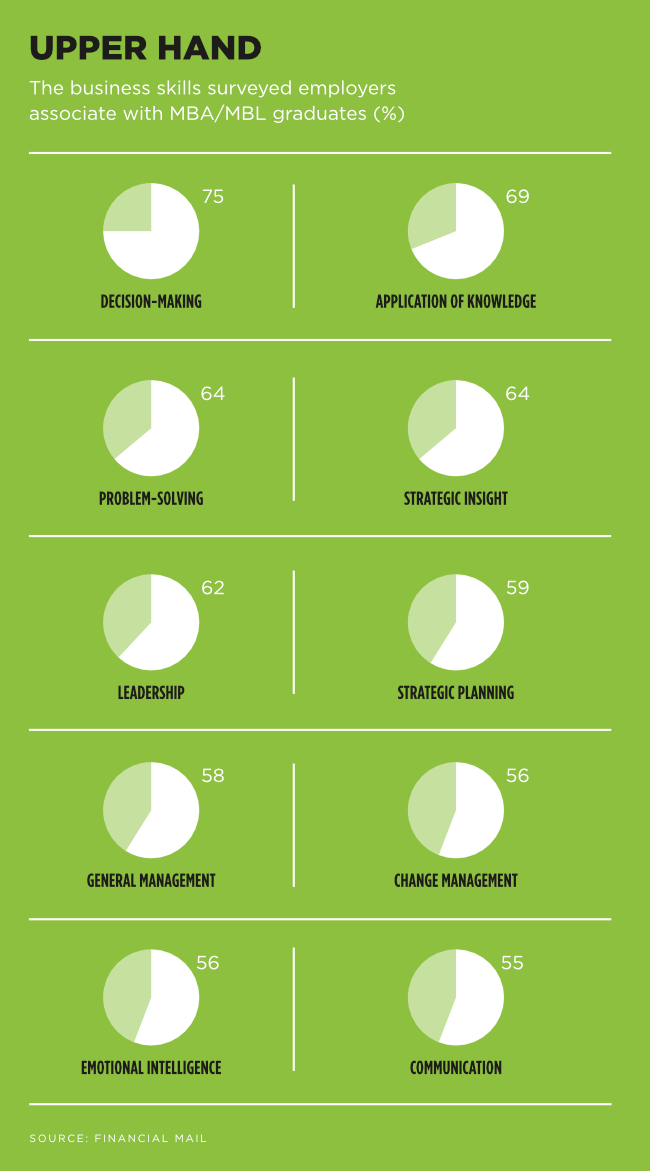MBA programmes ‘are like zombies, always returning from the dead’, according to US anthropology professor Andrew Orta. This may sound harsh when talking about the world’s ultimate business degree, until he explains that ‘applications may go down a couple of years in a row, spurring op-eds about the “death of the MBA”, but these programmes are remarkably adept at repositioning themselves, always rising from the dead’. In his book Making Global MBAs: the Culture of Business and the Business of Culture, Orta describes the resilience of this prestigious degree. For him, the ‘magic of MBA programmes’ lies in their weathering economic crises and scandals by ‘morphing and adapting to reinvent and recast the fundamental extractive logics and mechanisms of capitalism’.
SA’s world-class MBAs are a case in point. ‘Professor Orta’s analogy of MBA programmes as zombies resonates with the cyclical nature of debates surrounding their relevance,’ says Jon Foster-Pedley, dean and director of Henley Business School Africa. ‘Indeed, MBA programmes have demonstrated resilience by adapting to evolving economic dynamics and societal expectations. At Henley Africa, we continually evolve our curriculum, delivery methods and partnerships to stay ahead of emerging trends and meet the evolving needs of students and employers.’
He adds that ‘while criticisms of extractive logics in capitalism are valid, we believe that business education, when grounded in principles of ethics, sustainability and social impact, can be a powerful force for positive change. As such, our MBA programme strives to cultivate responsible leaders who can navigate complexity with integrity and purpose’.
Worldwide, business schools have been teaching non-financial issues – such as ESG aspects and responsible, purpose-driven leadership – in their MBA curricula for many years. These issues, together with soft skills such as cognitive flexibility, adaptability and resilience, are becoming increasingly important in the post-COVID world with its cross-cutting challenges relating to geopolitical conflict, social inequality and climate change. In fact, the global pandemic made massive changes necessary – not only in the way the MBA programmes are delivered but also in their learning content.
Wits Business School (WBS) for example, which is part of the Witwatersrand university in Johannesburg, conducted a formal review of its MBA programme in 2023 and, as a result, amplified its focus on ESG. ‘Our mission is to graduate leaders who are both agile and ethical,’ says Susan Benvenuti, WBS head of academic quality assurance. ‘Ethics and governance are major challenges facing business, and we seek to graduate leaders who can both manage change and have a positive impact. Our graduate competencies all speak to societal impact and the common good.’
WBS is home to the Good Governance Academy under the patronage of Mervyn King, the former Supreme Court judge who is behind the King Codes of Good Governance. To develop ethical leaders that embody King’s principles, the MBA now incorporates the mandatory core course ‘sustainability, ethics and governance in business’.
Benvenuti explains that ‘this course aims to introduce the concepts, issues and challenges related to sustainability, ethics and governance, and their role in business decision-making, value generation, strategy and conduct, providing a strong foundation and lens through which to undertake the courses and independent study projects in the MBA’.
The Gordon Institute of Business Science (GIBS) at the University of Pretoria has also refreshed its MBA programme. ‘Recency and relevancy are our top priority,’ says Hayley Pearson, executive director of academic education at GIBS. The refresh introduced two new MBA streams of focus areas – climate leadership (launched in 2023) and digital leadership (in 2024), to the existing ones (general management, entrepreneurship, consulting, manufacturing and health).
‘Our focus areas enable students to package their MBA programme according to the knowledge and skills they need to develop in order to remain relevant in the current and future world of work,’ says Pearson.
‘An important key change is the highly integrated nature of our MBA programme. The outcome of the learning process and the programme design demand that students integrate their learning from across traditional disciplines and really apply a systems approach, in order to understand the complexity of their operating environment.’
There’s a global trend towards personalisation so that students can tailor the MBA to their specific needs. At GIBS, students are able to choose not only from the seven focus areas/streams but also from more than 90 electives, in addition to various global module destinations, and their preferred format for the final mini-dissertation.
In a novel move for SA, WBS launched an entirely new MBA in the field of healthcare leadership, welcoming its first cohort in March this year. ‘This is a specialist MBA; not an MBA with a specialist stream,’ says Benvenuti. ‘Since we launched the programme in October 2023, we received considerable interest from a total of 136 applications and have a class of approximately 30 starting. We expect numbers to grow with increasing awareness.’
The programme targets professionals already working in the private and public healthcare sectors. The specialist MBA is a response to the pandemic, which highlighted the need for skilled leaders who are equipped to shape the future of healthcare and navigate reforms such as the National Health Insurance scheme.
Students will learn general management skills – as in typical MBA courses – but within a healthcare context.
‘Each module or core course in the MBA healthcare leadership is designed specifically around the healthcare sector and its challenges,’ says Benvenuti. ‘Courses such as “strategic leadership in healthcare”, “evolving healthcare law, policy and ethics”, or “entrepreneurship in healthcare” are all core courses, not electives.’
Meanwhile Henley Africa recently introduced MBA modules that specifically address pandemic-related challenges such as crisis management and resilience planning. ‘The COVID-19 pandemic has necessitated significant adaptations to our MBA programme to ensure continuity and relevance in a rapidly changing environment,’ says Foster-Pedley.
‘Key changes include the integration of hybrid learning models to accommodate remote participation, enhanced emphasis on digital skills and agility. Additionally, we have intensified our focus on supporting students’ well-being and professional development in the face of unprecedented uncertainty.’
In 2023, the Johannesburg-based school opened a new campus in Cape Town’s up-and-coming Woodstock area.
‘Our new Brickfield campus is indeed part of this strategic response, providing greater accessibility and flexibility for students across the region,’ says Foster-Pedley, recalling how his school has grown… In 2011, Henley Africa had five staff in a single office offering just one qualification, the MBA, and graduating 30 students. Since then, the number of graduates across the school’s programmes has increased to nearly 2 000 per year.
The variety of MBA formats offered in SA has also grown exponentially over the years, to maximise flexibility and accommodate students who work while studying. Johannesburg Business School, for example, uses the ‘carousel model’ for its fully online MBA programme, launching a new student intake every two months. Having six cohorts per year means students can start when it suits them. For added flexibility, they pay each module upfront, not the annual course fee, and can stop and start the programme as needed.
 GIBS offers two part-time formats (evening classes), two modular formats (short-block release and long-block release), and is one of three SA business schools still running a full-time format (alongside Regenesys and the UCT’s Graduate School of Business).
GIBS offers two part-time formats (evening classes), two modular formats (short-block release and long-block release), and is one of three SA business schools still running a full-time format (alongside Regenesys and the UCT’s Graduate School of Business).
‘Globally the full-time MBA is struggling with increased economic pressures and strong competition; even the top international schools are finding it difficult to maintain numbers to ensure economic viability of this format,’ says Pearson. GIBS has repositioned the full-time format as an ‘intensive MBA’, providing longer, more intensive study blocks and a different pacing that allows students complete immersion, with a degree after 16 months. The school says it won’t give up this market to its competitors anytime soon.
As international business schools are seeking to get a foothold in Africa, Pearson argues that ‘international is not always better’. She recalls the GIBS dean, Morris Mthombeni, reflecting on his own international qualification and stating, ‘I did my MBA in the UK to give myself the option to be employable outside of South Africa. I never exercised that option. And I found that the top business schools in SA are as good if not better than many of the schools in Europe, UK and North America. Knowing what I know now, I would choose an SA-based business school’.
What makes local MBAs particularly attractive are their price point, as you can get a world-class MBA from a top, triple crown-accredited institution at a fraction of the price of equivalent programmes in Europe and the US, says Pearson. ‘That, and the rich learning experience a country like South Africa has to offer.’
The increased competition from international business schools presents both challenges and opportunities for the existing MBA programmes. ‘While the influx of foreign business schools may intensify competition in the local market, it also signifies the recognition of South Africa as a hub for business education,’ says Foster-Pedley. ‘We believe healthy competition fosters innovation and raises standards, ultimately benefiting students.’
It’s also proof that the MBA is very much alive – and very necessary, as SA and the world are in dire need of responsible leaders who can solve global challenges and navigate through uncertainty towards a more sustainable future.










